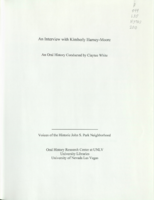Search the Special Collections and Archives Portal
Search Results

Transcript of interview with Flo Mlynarczyk by Claytee White, July 7, 2005
Date
Archival Collection
Description
Flo Mlynarczyk began life in Fort Morgan, Colorado. Her parents divorced and she moved with her mother first to Loveland and eventually to Los Angeles. Her mother started the first Red Cross in Bell Gardens, oversaw the building of their home, and raised money for various charities. Flo remembers when the Japanese were rounded up and interred during WWII. She was in grade school and recalls that one day they all just disappeared. Upon graduation from high school in 1943, Flo moved to Kodiak, Alaska, to live with friends. She recalls total blackouts on the streets of Kodiak due to the war, the Short Snorter Club, and her return to California after a bout of pneumonia. Back in Bell Gardens, Flo worked for a department store, married and divorced in 1945, gave birth to her son Michael in 1946, and ended up in Tonopah, Nevada, with a sister who ran a cafe there. After a second marriage ended, Flo moved to Las Vegas and began working at Phelps Pump and Equipment as a bookkeeper.
Text

Transcript of interview with Kimberly Harney-Moore by Claytee White, June 16, 2010
Date
Archival Collection
Description
Kimberly Harney-Moore and her three siblings were raised in the John S. Park Neighborhood in the 1960s and 1970s. Their parents, Tim and Kathleen Hamey, were educators. A nostalgic feeling for the neighborhood remains; perhaps, rekindled when she had close friends buy a house across the street from her childhood home. In this interview, Kimberly talks about the inviting character of the area's architecture, mentions a few names of neighbors she babysat for, and fondly recalls her job at Luv-Its Custard shop. There was a time when she would drive through the old neighborhood and be saddened by the lack of upkeep and the changes, but today it is a place being reborn to a new generation. Note: Tim Harney and Kathleen Harney, Kimberly parents, are also participants in the Voice of the Historic John S. Park Neighborhood oral history project.
Text

Transcript of interview with Otto Merida by Claytee White, May 18, 2017
Date
Archival Collection
Description
When looking back on his legacy in the Latinx community of Las Vegas, Otto Merida (1945 - ) takes great pride in being a Latin Chamber of Commerce [LCC] co-founder with Arturo Cambeiro. With the LCC, they forged a powerful economic entity that continues to provide the local Latino community with social and political influence. Growing up during the 1950s in Havana, Otto Merida fondly remembers his childhood despite living under the dictatorship of Fulgencio Batista. There were the murmuring sounds of explosions from afar on the way to baseball games, but also the warm Sunday family meals of Cuban soup with fideos. In this interview, he talks about the rising communist powers inspired by revolutionary Fidel Castro and the events that led his family to place him in the Peter Pan Program in 1961. The Peter Pan Program sent unaccompanied Cuban children to the United States to avoid potential instruction by Castro’s government. Merida still holds on to his mother’s final request upon leaving Cuba-“I want you to remember the address where we live and the phone number: Josefina 68-entre primera y segunda-La Víbora, Havana con el teléfono X4304.” As a part of the Peter Pan Program, Merida experienced a nomadic childhood living in barracks in Miami and a three-story home in Wilmington, DE. The only connection he had to his family were a series of letters he exchanged with his mother, until they reunited years later in Miami. For Merida, life on 79th Street and Biscayne Boulevard in Miami was defined by the values of his family and other Cubans and African Americans in his neighborhood. v Merida earned his bachelor’s degree in Political Science from the University of Florida. He credits his sister-in-law with a pivotal role in his decision to pursue a higher education. His engagement in politics continued through his involvement with the Cuban Circle, the first Hispanic community to be involved with politics in Las Vegas. He describes the migration of Cubans to the casino scene of Las Vegas and the presence of Cubans in the community. His work with the Cuban Circle inspired him to develop a political presence for Hispanics in the community. While travelling across the United States before settling in Las Vegas, Merida made many significant relationships while working with associations such as the Fitchburg Chamber of Commerce and Volunteers in Service to America [VISTA]. Living in Las Vegas, Otto Merida worked as an educator and community organizer. In the late 1970s, Merida and Arturo Cambeiro collaborated to create the Latin Chamber of Commerce of Las Vegas. For Merida, the Chamber consistently goes above and beyond the vision he and Cambeiro had created when they first opened their doors. From the creation of the Latino Youth Leadership Program at UNLV to their work alongside political figures such as Senator Catherine Cortez-Masto, Merida is extremely proud of the various accomplishments of the Chamber. Now as President Emeritus, Otto Merida continues to dedicate himself to the Chamber as a volunteer and serves as one of the many Latinx Voices of Southern Nevada that have shaped the greater Las Vegas community.
Text

Transcript of interview with Sonja Niekerk Walther and Wilma Vandenberg, November 20, 2017
Date
Archival Collection
Description
The documentation of the Holocaust of World War II reveals the desperation of Jewish families to protect their loved ones from doom. In this oral history, Sonja (neé Niekerk) Walter recalls the story of being an infant handed off to a family friend for safety and nurturing. Next to Sonja is Wilma, her “sister” and the biological daughter of that friend. Sonja and Wilma are tethered together by history and love for Cor Vandenberg, mother and protector. Sonja was born in 1943 Holland to Simon and Rose Niekerk. At thirteen days of age she was given sanctuary by Cor, who raise her as her own for the next two and half years. She and Wilma reminisce about the circumstances that brought them together, their love of Cor, and the impact of being a child survivor of the Holocaust. Sonja also shares her family’s journey to the United States and to Las Vegas.
Text

Transcript of interview with Ellis Landau by Barbara Tabach, November 28, 2017
Date
Archival Collection
Description
In 1990, Las Vegas became home to Ellis Landau and his attorney wife, Yvette. They moved from Phoenix, Arizona when Ellis accepted a position as Executive Vice President and Chief Financial Officer with Boyd Gaming. The relocation also included a desire to become active in the local community. Temple Beth Sholom was one of their first connections. For Ellis the Jewish community of a newer city like Las Vegas differed immensely from his childhood upbringing in a more ethnic Jewish community outside Philadelphia. Nevertheless, Ellis soon became active on the Temple Beth Sholom board, and is a past Treasurer and President. The couple are among the founders of the Warsaw Memorial Garden at the synagogue. In 2006, Ellis was honored as Temple Beth Sholom’s “Man of the Year.” The Landaus have been significantly involved with other local organizations such as Nathan Adelson Hospice and the Las Vegas Philharmonic. Ellis’s dedication to the Anti-defamation League, both on a local and regional level, is a beacon of inspiration to others. The Landaus are sponsors of ADL’s “No Place for Hate” program. Ellis is a graduate of Brandeis University in economics and has a Masters of Business Administration from Columbia University School of Business. His former career steps include Ramada Inc. and U-Haul Corporation.
Text

Transcript of interview with Robert & Patricia Campbell by Stefani Evans, November 28, 2017 & March 1, 2018
Date
Archival Collection
Description
In 1976, when Bob Campbell accepted the city manager position in Henderson, Nevada, he and his family had just endured nearly a month of sub-zero temperatures in their native Missouri. Southern Nevada's mild winter coupled with the promise of developing the 8,600 acres that would become Green Valley convinced Bob and his wife, Pat, to make the move. Bob came to Henderson with a degree in public administration and city manager experience in two Missouri towns, but Green Valley offered something akin to "an artist having a blank canvas on which to plan and create." In this interview, Bob talks about the ways his career in public administration blossomed in Southern Nevada. After about five years with the City of Henderson, Campbell joined Mark Fine and American Nevada Corporation to develop Green Valley; five years after that, he moved to Southwest Gas Corporation to work with Bill Laub and later, Kenny Guinn. From about 1989 to 1997, he helped develop Lake Las Vegas. In 1994, Bob and Pat together formed The Campbell Company, a private consulting firm whose clients included Transcontinental Properties' Lake Las Vegas project as well as Henry Chen's Ascaya. v Much of the interview focuses on the Lake Las Vegas project: its original visionary, false starts, and its tumultuous development as an arm of the Bass brothers of Fort Worth, Texas; their developer, Ronald Boeddeker of Transcontinental Properties in Santa Barbara, California, and Boeddeker's appointee, Alton Jones. Along the way Campbell shares the strategies employed by the Wednesday morning group of Henderson boosters who met at Saint Peter's Catholic Church and who succeeded in gaining the necessary local, state, and federal approvals to move the project forward. He reveals the intimidation, physical threats, and sexual harassment suffered by those who questioned the way Jones did business. Overall, though, he explains why he continues to respect the Bass brothers and is still proud of Lake Las Vegas, "proud that we got it on, and proud that it's turned out to be what it is."
Text

Transcript of interview with Steve Riback by Barbara Tabach, December 12, 2017
Date
Archival Collection
Description
Sgt. Steve Riback is a Detective Sergeant for the Las Vegas Metropolitan Police Department. He has been with the police force for nearly twenty years. On the night of the Route 91 Harvest festival shooting, he had just returned home shortly after 10pm. He had been on an overtime assignment at the Golden Knights hockey game at the T-Mobile prior to the shooting. When he was abruptly awaken by a call from his lieutenant, he was oblivious to the time and immediately rushed into action—contacted his squad members and sped to his station in northwest part of the city. He reflects on his overwhelming pride of the police that day, recalling what he heard on his police radio, seeing the rush of police cars being dispatched, and watching a body camera video later. Sgt. Riback’s squad was assigned to Spring Valley Hospital where they worked tirelessly to identify victims, both injured and deceased. His reflections stir the image of medical professionals and police officers urgently fusing together to handle the situation at hand. Riback shares a myriad of emotions, talks about the options available for officers to deal with their personal trauma, and how he explained to his eight-year-old why Daddy was crying. Riback is also known as the Kosher Cop and has authored a book, My Journey Home, about becoming an observant Orthodox Jewish officer and his struggle for the right to wear his beard and a yarmulke while on duty.
Text

Brian Greenspun interview, 2018: transcript
Date
Archival Collection
Description
Interviewed by Barbara Tabach. Publisher of Las Vegas Sun, child of Hank and Barbara Green. Part 1 Subjects: Las Vegas Sun, Greenspun family, Israel gun running; Part 2 subjects: Journalism importance, Las Vegas Sun, Watergate tie-in with Hank's safe, October 1 shootings reflections; Part 3 subjects: Hank and Barabara Greenspun. Talks about Jewish visionaries of Las Vegas that includes Art Marshall, Jack Entratter, Sheldon Adelson, Nate Mack; Part 4: Interviewed by Barbara Tabach. Las Vegas Sun newspaper publisher and native Las Vegan talk about events and people from Las Vegas' years of him growing up. From watching pink smoke from test site to hanging out with friends in the John S. Park neighborhood to racial riot of 1969 to playing golf as a kid.
Text

Transcript of interview with Millicent Rosen by Barbara Tabach, June 23, 2015
Date
Archival Collection
Description
Until her passing in 2017, Millicent (Siegel) Rosen was the living link to Benjamin “Bugsy” Siegel, one of Las Vegas’ most notorious links to the Jewish mob. A steadfastly independent woman herself, Millicent recalls Benjamin as a loving father to her and her younger sister. She is proud of his status as a Las Vegas visionary, though she affixes a footnote that the city of today might not be to his liking. She includes a few anecdotes about common names of the early days, including Meyer Lansky who walked her down the aisle when she married Jack Rosen. They had three children: Benjamin, Cindy, and Wendy. Millicent moved to Las Vegas to be with her daughter and her family in about 2000 and cherished her role as a grandmother. Always an artist at heart, Millicent once painted canvases for needlepoint and in 2015 promoted her clothing line.
Text

Transcript of interview with Hazel Hedges by Irene Rostine, October 29, 1997
Date
Archival Collection
Description
Interviewed by Irene Rostine. Hazel Hedges moved from Kansas City to Las Vegas with her husband and son in 1952. She worked briefly as a waitress in the dining room at the Thunderbird and then became a stay at home mom until her son was in junior high. Then after she went to real estate school, she went to work in commercial real estate at Bond Realty. After that, she passed her brokers exam and transferred to Parkway Realty where she sold land. Her primary success in real estate came from selling houses and investing in land and residential properties personally. After leaving Parkway Realty, Hazel went to work for the real estate office Deshoor, Fair, and Davis, which she eventually bought and renamed Southside Realty. Eventually her son joined her, and they operated Hedges and Wade Realty with two offices, one on each side of town. Hazel also did volunteer work including the Assistance League Las Vegas' Operation School Bell Program, which provides clothing for area school children in need.
Text
